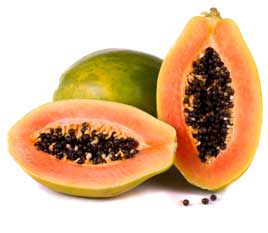




Papaya -
F

1. Papaya Facts
2. Types of Papaya
3. Nutritional Value of Papaya
4. Health Benefits of Papaya
2. Types of Papaya
3. Nutritional Value of Papaya
4. Health Benefits of Papaya
Papaya Facts
History and Origin
Types of Papaya
Types of Papaya grown and sold in Australia
Papaya Nutritional Value
|
Fruit ” Papaya ” ( Nutritional value )
Nutritional value per 100 g Papayas, raw |
|||||||||||||||||||||||||||||||||||||||||||||||||||||||||||||||||||||||||||||||||||||||||||||||||||||||||||||||||||||||||||||||||||||||||||||||||||||||||||||||||||||||||
|
Weight of Fruit – 1 cup, (2.5cm” pieces) = 145 g
|
|||||||||||||||||||||||||||||||||||||||||||||||||||||||||||||||||||||||||||||||||||||||||||||||||||||||||||||||||||||||||||||||||||||||||||||||||||||||||||||||||||||||||
|
|||||||||||||||||||||||||||||||||||||||||||||||||||||||||||||||||||||||||||||||||||||||||||||||||||||||||||||||||||||||||||||||||||||||||||||||||||||||||||||||||||||||||

|
Reference Values are based on a 2,000 Calorie Intake, for Adults and Children 4 or More Years of Age. Your daily values may be higher or lower depending on your calorie needs.
|
|
Percentages are roughly approximated using (RDA) Recommended Dietary Allowances for adults. Source: USDA United States Department of Agriculture
|
|
Reference Values for Nutrition – National Institutes of Health USA
|
Papaya Nutritional Value
Papaya Health Benefits
Papaya

HEALTH
References
|
Nutrient Database – USDA (United States Department of Agriculture)
|
|
Reference Values for Nutrition – FDA U.S. Food and Drug Administration
|
